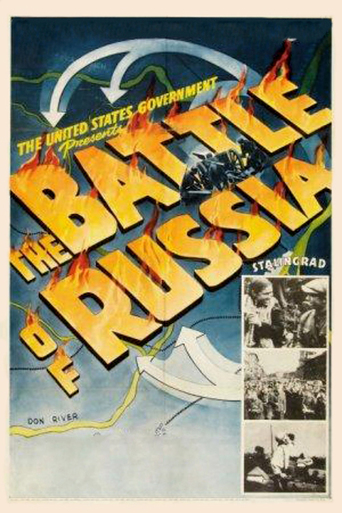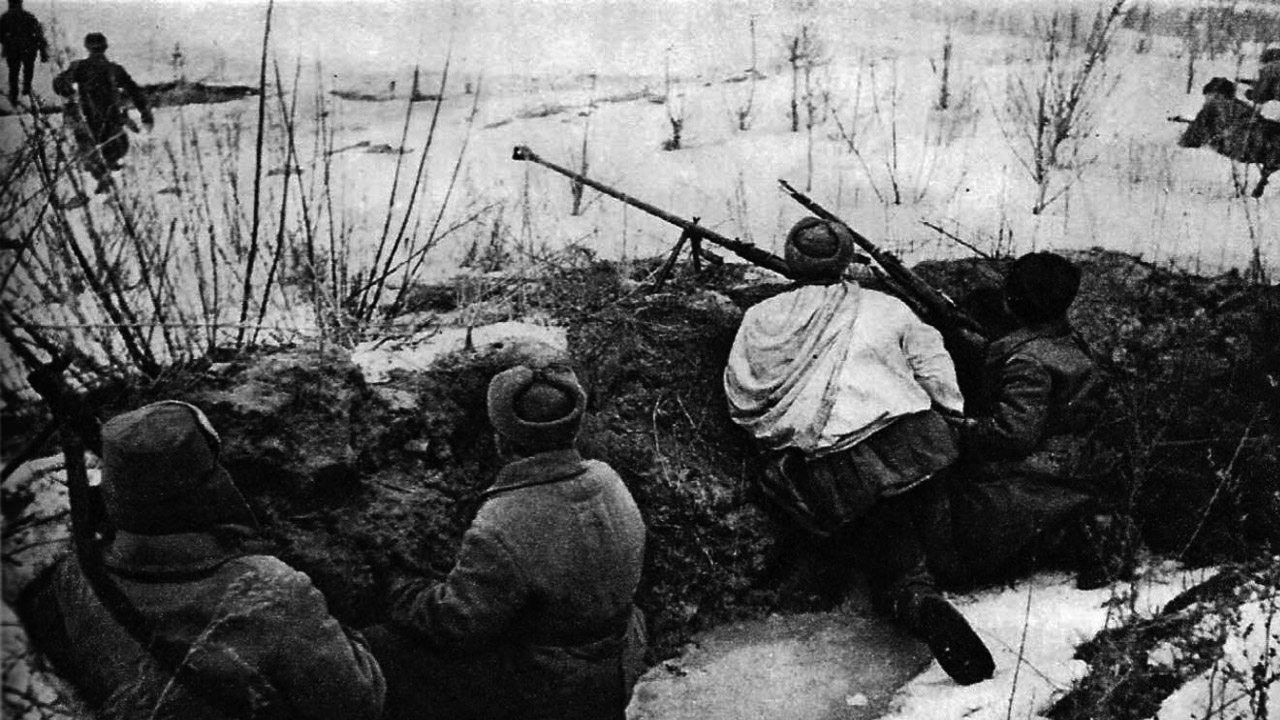Theo Robertson
In June 1941 Nazi Germany invaded the Soviet Union . Less than four years later the outcome was 35 million dead human beings , Nazi German defeat and a " cold war " that lasted 45 years with the threat of humanity destroying itself in nuclear conflict . One of the characteristics of the cold war was both the Soviets and Americans trying to paint themselves whiter than whiter and the other side blacker than black . America being a democracy and with a free press found the task slightly more difficult but let us not forget the McCarthy witch hunts of the 1950s and of popular fiction of the period when every science fiction film with an alien invasion was spearheaded from Mars the red planet because ... well reds are commies are they not ? Bearing this in mind perhaps the most successful propaganda to come out of America was when the Soviets were our friends in the battle against Nazism and this propaganda piece is propaganda at its most enthralling One massive irritating thing about this documentary is in the use of the word that appears in the title - Russia . It's used euphemistically . Being a Scot someone uses the word " England " or " English " when the word " Britain " or " British " is meant even very mild mannered Celts with no real nationalist instinct get very angry at this lazy mistake and one feels great pity for the 193 million citizens featured in this tribute constantly being referred to as Russians when in fact they're Soviets Facts are ignored to a large degree because this is a propaganda film though be it a superlative one . The Nazi strategy of Blitzkrieg is referred to as defeating Poland in 18 days . Not inaccurate though it does miss out the important point that after 18 days the Soviet Union then invaded the Polish eastern border and imposed a reign of terror on the Poles living there . When the Nazi invasion of the Soviet Union is underway it over states the capacity of the Germans who were reliant upon the horse and cart rather being an entirely motorised and mechanical force as is insinuated here . The Soviet defence in depth is not nearly as effective as painted and the German slowed down due to logistical problems and the onset of the Russian Winter , the Soviet " not one step back " mindset was often down to commissars and NKVD special squads enforcing Stalin's orders in the first six months of the war rather than the average Red Army soldier's fighting spirit and religion was only legalised because of the War . Part one of the film ends with the Russians being described as " Free and united people " which is not the case since communism isn't a democratic ideal centered around freedom and more than a few Soviet citizens most notably in the Baltic states and the Ukraine sided with the Nazis But where propaganda works best is in emotion combined with an element of truth and the truth is the Nazis butchered millions of Soviets simply because being of Slavonic ethnicity they were considered " untermenschen " by the Nazi regime and this film pulls no punches on the atrocities forced upon the Soviets . We see the bodies of dead children who were burned alive by the Nazis and of young women who have suffered rape at the hands of the Nazis who not only ignored the Geneva convention but ironically their own Nuremberg laws involving race mixing . This film will have you weeping tears for Soviet suffering and have you cheering as they take the fight to the fascist hordes in what is one of the best propaganda pieces you will ever see . So much so that that if it wasn't some of the airbrushing of history as I mentioned earlier such as the Soviets attitude of Poland I would have no hesitation in saying it's one of the greatest documentaries ever made on the Second World War and shows the Soviet blood sacrifice as being the main reason for the defeat of Hitler's regime
G K
Why We Fight is a series of feature-length compilations released during 1942-1945, primarily for showing to the armed forces, these were superbly vigorous documentaries which later fascinated the public at large.Most of the films were directed by Frank Capra, who was daunted yet also impressed and challenged by Leni Riefenstahl's propaganda film Triumph Of The Will (1935) and who worked in direct response to it. The Battle of Russia is the fifth film of Capra's Why We Fight film series, and the longest film of the series. The scorched earth Soviet tactics, the room-to-room urban warfare in Soviet cities, and the guerilla warfare behind enemy lines are used to underline the Soviet resolve for victory against the Nazis.
classicsoncall
In 1939, Hitler signed a non-aggression pact with Russia, giving himself time to mount an offensive against the European countries to his West. With all but Britain defeated and subjugated to German rule, Hitler turned his sights once again to Russia. Russia would be extremely valuable to the Fuehrer, in terms of size, raw materials and manpower. His world view of the German master race left every other country on the planet subject to his vision of supplying slave labor for the Nazi cause.The invasion of Russia began on June 22, 1941 with the same strategy that proved so successful throughout Europe - pincer attack the enemy on opposing fronts, then circle the enemy to elicit surrender. The Russians however came up with an effective counter strategy. Rather than committing to a single line of defense, they initiated a series of defensive lines positioned one behind the other, so that if one of their positions was breached, it could join up with the one behind it to increase it's strength. Additionally, knowing the ferocity of the German army, Russia's leaders weren't as concerned about saving their cities as much as defeating the enemy. With that in mind, the Russians themselves destroyed much of their own infrastructure - fields, farms and factories - rather than have them fall into Nazi hands.With the invasion of Russia, the legend of Nazi invincibility was finally shattered. The city of Leningrad emerged from a seventeen month German siege still free, while Stalingrad, a modern Russian city named after it's (then) present day leader, Josef Stalin, also survived the Nazi onslaught. The humiliating Nazi defeat resulted in twenty three German divisions captured, a total of three hundred thirty thousand men.Yet the Russian victory came at a high cost. To see the citizens of Leningrad and Stalingrad grieve over their cities' destruction and the deaths of loved ones is excruciating. It is totally unimaginable, watching from the comfort of one's living room, to understand what it must have been like to not only survive the sub-freezing temperatures of the Russian winter, but to carry on a front line offensive at the same time. One can only imagine what America's new soldiers might have been thinking at the time as they watched these horrors unfold, while preparing to invade Europe in the name of freedom and liberty.
Michael_Elliott
Battle of Russia, The: Part 1 (1943) Battle of Russia, The: Part 2 (1943) ** 1/2 (out of 4)The IMDb lists this as a single movie but I'm breaking it into two since it was originally released as two parts. Frank Capra once again shows us the history of Russia in various wars plus how they fought the Nazis during WW2. This here was probably the least interesting of all the Capra docs from this period. Part one focuses on the early years of Russia and I found the storytelling quite dull and tiresome. Part two picks up with WW2 but again, I found it rather tiresome even with the actual war footage.


 AD
AD

